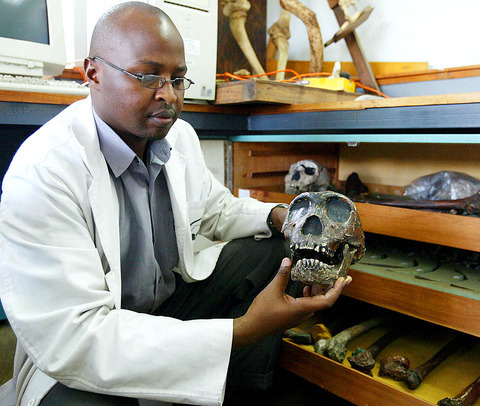Deep in the dusty, unlit corridors of Kenya's national museum, locked away in a plain looking cabinet, is one of mankind's oldest secrets. "Turkana Boy," as he is known, is the most complete skeleton of a prehistoric human ever found.
But his first public display later this year is at the heart of a growing storm -- one pitting scientists against Kenya's powerful and popular evangelical Christian movement. The debate over evolution -- once largely confined to the US -- has arrived in a country known as the cradle of mankind.
"I did not evolve from Turkana Boy or anything like it," says Bishop Boniface Adoyo, head of the country's 35 evangelical denominations, which he claims has around 10 million followers. "These sorts of silly views are killing our faith," he said.

PHOTO: AP
He's calling on his flock to boycott the exhibition and has demanded the museum relegate the fossil collection to a back room -- carrying some kind of warning that evolution is not a fact but merely one of a number of theories.
Against him is one of the planet's best-known fossil hunters, Richard Leakey, whose team unearthed the bones at Nariokotome in West Turkana, in the desolate, far northern reaches of Kenya, in 1984.
"Whether the bishop likes it or not, Turkana Boy is a distant relation of his," said Leakey, who founded the museum's prehistory department.
"The bishop is descended from the apes and these fossils tell how he evolved," he said.
Among the 160,000 fossils due to go on display is an imprint of a lizard left in sedimentary rock, dating back 200 million years, at a time when the Earth's continents were only beginning to separate.
Dinosaur fossils and a limb bone from an early human ancestor, dating back seven million years, will also be on show along with bones of short-necked giraffes and elephants whose tusks protrude from their lower, rather than upper jaw.
They provide the clearest record yet of evolution and the origins of man, say scientists.
But the highlight will be the 1.52m tall Turkana Boy, who died aged 12 and whose skeleton had been preserved in marshland before its discovery.
It will form the center stage of the exhibition to be launched in July following a massive US$10.5 million revamp of the National Museums of Kenya, financed by the EU. The EU says it has no concerns over the displays and that the museum was free to exhibit what it wished.
Adoyo's evangelical coalition is the only religious group voicing concerns about the exhibition.
Leakey fears the ideological spat may provoke an attack on the priceless collection, one largely found during the 1920s by his paleontologist parents, Louis and Mary Leakey.
The museum, which attracts around 100,000 visitors a year, is taking no chances.
Turkana Boy will be displayed in a private room, behind a glass screen with 24 hour CCTV. Security personnel will guard the entrance.

FORUM: The Solomon Islands’ move to bar Taiwan, the US and others from the Pacific Islands Forum has sparked criticism that Beijing’s influence was behind the decision Tuvaluan Prime Minister Feletei Teo said his country might pull out of the region’s top political meeting next month, after host nation Solomon Islands moved to block all external partners — including China, the US and Taiwan — from attending. The Pacific Islands Forum (PIF) leaders’ meeting is to be held in Honiara in September. On Thursday last week, Solomon Islands Prime Minister Jeremiah Manele told parliament that no dialogue partners would be invited to the annual gathering. Countries outside the Pacific, known as “dialogue partners,” have attended the forum since 1989, to work with Pacific leaders and contribute to discussions around

END OF AN ERA: The vote brings the curtain down on 20 years of socialist rule, which began in 2005 when Evo Morales, an indigenous coca farmer, was elected president A center-right senator and a right-wing former president are to advance to a run-off for Bolivia’s presidency after the first round of elections on Sunday, marking the end of two decades of leftist rule, preliminary official results showed. Bolivian Senator Rodrigo Paz was the surprise front-runner, with 32.15 percent of the vote cast in an election dominated by a deep economic crisis, results published by the electoral commission showed. He was followed by former Bolivian president Jorge “Tuto” Quiroga in second with 26.87 percent, according to results based on 92 percent of votes cast. Millionaire businessman Samuel Doria Medina, who had been tipped

Outside Havana, a combine belonging to a private Vietnamese company is harvesting rice, directly farming Cuban land — in a first — to help address acute food shortages in the country. The Cuban government has granted Agri VAM, a subsidiary of Vietnam’s Fujinuco Group, 1,000 hectares of arable land in Los Palacios, 118km west of the capital. Vietnam has advised Cuba on rice cultivation in the past, but this is the first time a private firm has done the farming itself. The government approved the move after a 52 percent plunge in overall agricultural production between 2018 and 2023, according to data

ELECTION DISTRACTION? When attention shifted away from the fight against the militants to politics, losses and setbacks in the battlefield increased, an analyst said Recent clashes in Somalia’s semi-autonomous Jubaland region are alarming experts, exposing cracks in the country’s federal system and creating an opening for militant group al-Shabaab to gain ground. Following years of conflict, Somalia is a loose federation of five semi-autonomous member states — Puntland, Jubaland, Galmudug, Hirshabelle and South West — that maintain often fractious relations with the central government in the capital, Mogadishu. However, ahead of elections next year, Somalia has sought to assert control over its member states, which security analysts said has created gaps for al-Shabaab infiltration. Last week, two Somalian soldiers were killed in clashes between pro-government forces and